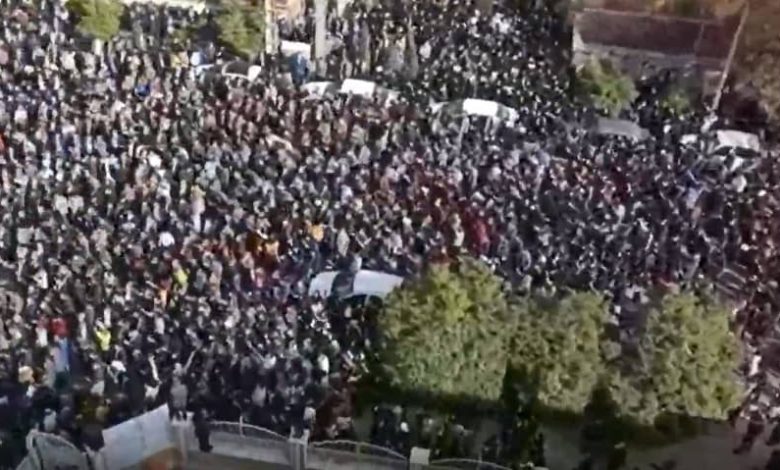Iran’s Crackdowns, Prisoner Abuse Continued Immediately After Human Rights Day

Written by
Shamsi Saadati
Familiar abuses have continued being reported inside Iran over the past several days, coinciding with the International Human Rights Day last Friday.
Several days before that, various Members of the European Parliament issued a statement and also took part in a conference organized by the National Council of Resistance of Iran to demand international recognition of Iran’s 1988 massacre of political prisoners as a crime against humanity.
On Human Rights Day itself, Amnesty International launched a new Persian language website focused on Iran’s historical and ongoing human rights abuses, including the crackdown on individuals who participated in a nationwide uprising in November 2019.
The following day, Iranian activist networks revealed multiple fresh instances of authorities exerting violent pressure on activists and dissenting voices both inside prisons and in society as a whole. Rasoul Badaghi a civil activist and member of the Iranian Teachers Trade Unions Coordination Council was arrested and beaten by officers at his own home on Saturday. The incident stood out among a number of similar reports of clashes with teacher activists who have been staging protests recently as part of a much larger movement pushing for fair pay and an end to the harassment of their colleagues.
Iranian Teachers Hold Three-day Strikes in Protest to Government Policies
Many of the clashes resulting from those protests have been captured on video and shared via Iranian social media users, sparking public condemnation of the authorities’ repression. This supportive response is by no means unique to teacher activists but was also witnessed around the end of November when attacks upon demonstrations by farmers in Isfahan resulted in at least 100 innocent people being wounded, of which roughly 40 were blinded in at least one eye after being shot with projectiles at close range. Almost immediately, protesters began appearing in the streets and online while wearing eye patches to demand accountability for the excessive violence.
The day after the public witnessed and decried Badaghi’s violent arrest, the teachers’ unions were struck a new blow with the release of the latest national budget. Whereas it provided a 240 percent increase for the Islamic Revolutionary Guard Corps and a 56 percent increase for the propaganda outlet Islamic Republic of Iran Broadcasting, teachers and other Iranians received a wage hike of only 10 percent – not nearly enough to keep up with the current runaway pace of inflation. This situation is almost certain to spark further protests in the near future from teachers whose current slogans emphasize that their standard wages are three million tomans, while Iran’s poverty rate is 10 million.
The undeclared figures in Iran’s 2022 budget
New protests can be expected to result in new clashes, which in turn can be expected to result in further arrests. This is made all the more likely by the nature of the regime, whose President Ebrahim Raisi not only played a lead role in the November 2019 crackdown but also canceled a scheduled wage increase for teachers as one of his first acts after being selected in June.
Dozens of teachers are already serving prison sentences today as a result of their organizing activities, and like all other political prisoners, they face considerable pressure from authorities within notorious Iranian institutions. The punishing conditions of those institutions were also quick to draw attention from human rights defenders in the immediate aftermath of Human Rights Day, as regime authorities applied new pressure and political detainees responded with new protests from behind bars.
In Urmia Prison on Sunday, 47 prisoners began a coordinated hunger strike after having been forcibly and arbitrarily transferred to a new, maximum-security ward that is more crowded than their prior housing and contains insufficient facilities for the number of prisoners. The change to their surroundings is reminiscent of similar transfers that have been carried out in other facilities during recent years, all of which led to a downgrade in already quite inhumane and unsanitary living conditions. The prisoners’ hunger strike continues to this day.
Often, the inherently harsh conditions of political wards are exacerbated by systematic mistreatment from guards, as well as by practices that seek to isolate political detainees and subject them to greater pressure in day-to-day life. In the wake of Human Rights Day, this sort of pressure and isolation has intensified in Sheiban Prison in Ahvaz, with political detainees being barred from leaving their ward or even speaking to members of the general prison population, who have been threatened not to engage with residents of the political ward.
As the Iranian Resistance has long urged, the United Nations Secretary-General, the UN Human Rights Council, the UN High Commissioner for Human Rights, and relevant UN rapporteurs, as well as other human rights organizations should condemn the clerical regime’s torture, ill-treatment, and elimination of political prisoners. The dossier on the egregious and systematic human rights violations in Iran must be referred to the UN Security Council.

